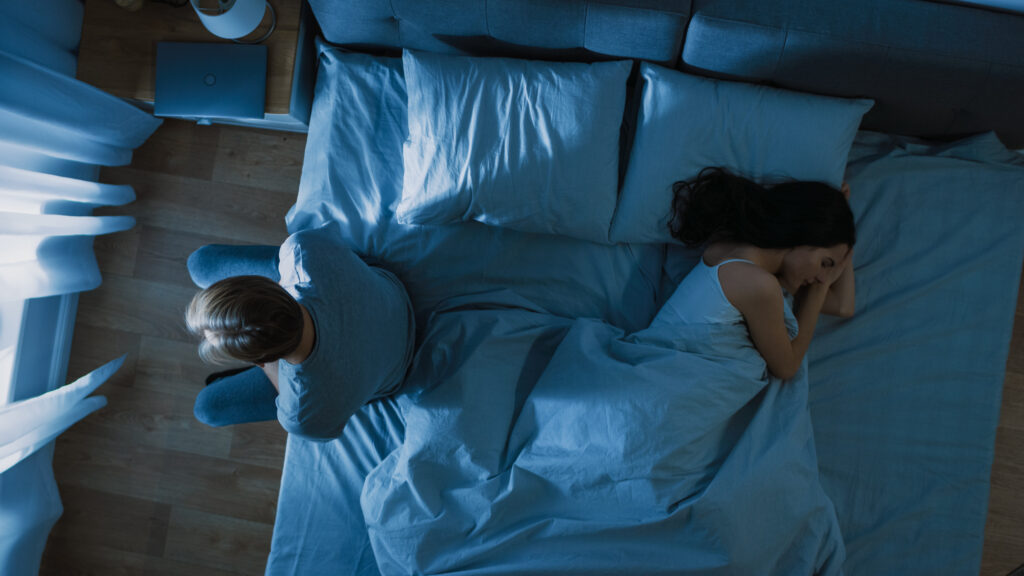
Causes and Solutions for Going to the Bathroom at Night
It’s hard enough to get a good, restful night’s sleep, but it’s especially difficult when you’re constantly getting up and going to the bathroom at night. If you’re an avid bedtime water drinker or just simply have a small or weak bladder, you’re likely one of those waking up to pee often, but did you know there’s a name for this? And although it may be frustrating, did you know it’s not uncommon? More importantly, did you know there are specific causes as well as tips and tricks for how to stop waking up to pee and how to avoid going to the bathroom at night altogether? We’re here to answer those questions to hopefully get your sleep schedule on track so you’re sleeping more and going to the bathroom at night less.
Having “to go” during the night is a condition called nocturia, which can also be thought of as nocturnal urinary frequency, meaning having to urinate more frequently at night. This condition often becomes more common as people get older and occurs in both men and women alike. It’s very common for people to wake at least once to use the restroom, but for those waking up to pee often throughout the night, this may be a sign of nocturia.
Reasons for Going to the Bathroom at Night
There are many different reasons why you might be waking up often to pee, such as age, personal nighttime habits, medical conditions, or bladder infections. Here is a list of common causes, provided by Everyday Health.
List of common causes for going to the bathroom at night:
- Sleep Apnea: 50% of people with sleep apnea report experiencing frequent nighttime urination. This happens because as we strain ourselves to breathe against a closed airway, our heart muscle is stretched and then puts out a hormone that increases urine production in the body.
- Congestive Heart Failure: Throughout the day, gravity and the heart’s decreased ability to pump normally often causes fluid to accumulate within the legs. So, when we lay down for bed, this fluid re-enters the bloodstream, causing increased urine production.
- Diabetes: Elevated glucose levels within the kidneys at night draw more fluid into the urine, resulting in increased urine formation that exceeds regular nighttime urination.
- Increased Age: Decreased bladder capacity and overactive bladder muscles are often associated with increased age.
- Alcohol & Caffeine: Drinking alcohol or caffeinated beverages before bed can be a cause of increased night urination. They are diuretics, which means that consuming them results in your body producing more urine.
- Medications: Late-night use of diuretic medications can increase urine in the body. A straightforward solution is to take these types of medications in the morning instead.
- Neurological Disorders: Neurodegenerative disorders like Parkinson’s and autoimmune disorders like Multiple Sclerosis are accompanied by nervous system dysfunction, resulting in severe bladder dysfunction and increased nighttime urination.
- Urinary Tract Infections: Frequent nighttime urination can result from both chronic or recurrent urinary tract infections.
- Excessive Fluid Intake: Some people consume more than 30% of their daily fluids after dinner and before bedtime, resulting in more frequent bathroom breaks throughout the night.
- Obesity: In some studies, abdominal obesity has been associated with increased nighttime urination, which could be due to unrecognized sleep apnea.
How to Avoid Going to the Bathroom at Night
The biggest trick for how to stop waking up to pee is to become aware of the above causes and work with a professional to determine a solution specific to your needs. Additionally, here are some simple changes you can make.
Guidelines and changes designed to help reduce going to the bathroom at night:
- Reduce evening fluid intake, especially prior to bedtime.
- Decrease evening alcohol/caffeine consumption.
- Elevate legs an hour or so before bedtime and throughout the day to redistribute fluid.
- Focus on sleep hygiene, including maintaining a clean bedroom and sleep environment.
- Keep a consistent schedule, and wake up at the same time on weekdays and weekends.
- Have a steady bedtime-get-ready routine.
- Learn relaxation techniques for easing your mind when you lie down for bed, and when you want to resume sleep after going to the bathroom at night.
- Get comfy; set up your bed with cozy bedding and pillows and a comfortable mattress.
- Customize your bedroom according to your preferences (i.e., minimal noise and light, cool temperature, pleasant aroma, etc.).
- Limit the use of any electronic devices before bed as they stimulate the brain and reduce the production of melatonin – the sleep-promoting hormone.
Along with making some simple lifestyle changes and taking the recommended steps to limit your bedtime trips to the bathroom, it’s important to work with both a doctor and sleep specialist. They can help determine what might be causing your frequent nighttime urination and the best path to fixing the problem. Together, you can establish a plan to get your sleep schedule back on track, sleeping soundly through the night, and waking refreshed and ready in the morning.
Need help from a sleep specialist for nocturia or other sleep issues? Contact us today to set up an appointment.

